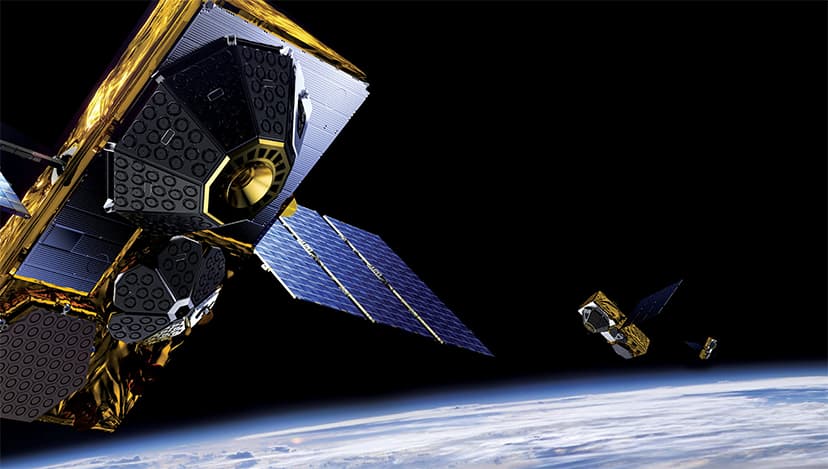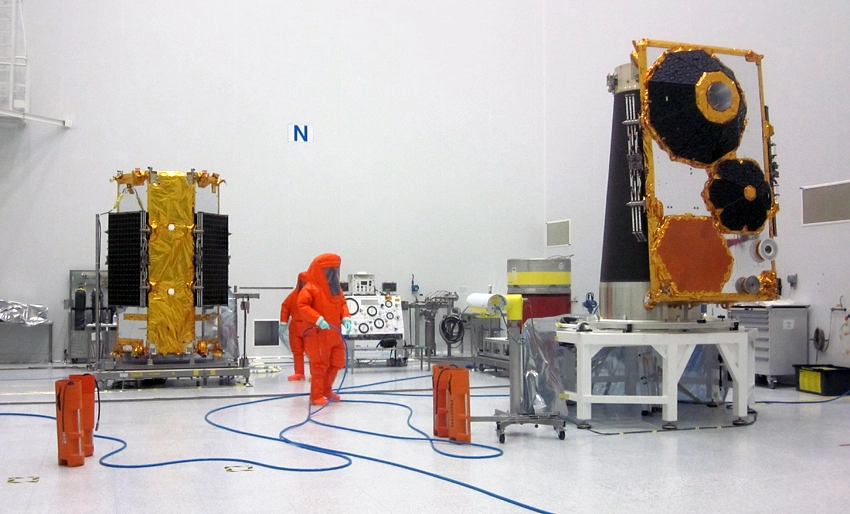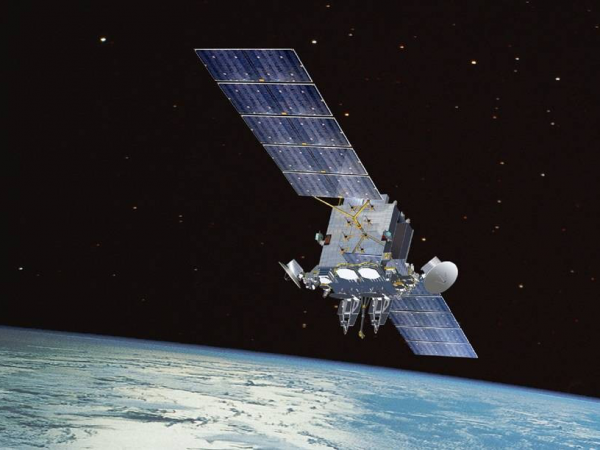Globalstar
Globalstar is an American satellite communications company that operates a MEO satellite constellation consisting of 24 satellites for satellite phone and data communications. The entire initial constellation of 52 satellites was launched between 1998 and 2007, with the first launch scheduled on February 14th, 1998. A replenishment launch of four satellites was made in 2007.
The first call on the original Globalstar system was made on November 1st, 1998, between Qualcomm CEO Irwin Jacobs in San Diego and Bernard Schwarz, CEO and Chairman of Loral Space & Communications in New York City.
With over 425,000 subscribers, the company is a leading provider of mobile satellite voice and data services for consumers with coverage in more than 120 countries around the world. The company’s products include mobile and fixed satellite telephones, simplex and duplex satellite data modems, the SPOT Satellite GPS Messenger™ and flexible airtime service packages.


The company supports many land-based and maritime industries including markets in the oil and gas, government, mining, forestry, commercial fishing, utilities, military, transportation, heavy construction, emergency preparedness and business continuity as well as individual recreational users.
The latest satellites are based on the SSL LS-400 platform, and launched in clusters using various launch operators.
In November 2001 Globalstar Telecommunications, Ltd., voluntary filed for Chapter 11 bankruptcy protection to restructure its financial position and to negotiate with its creditors to convert its debt-to-equity positions in a new Globalstar company. The restructuring of the old Globalstar was completed in 2004.
Company History
Globalstar was founded in 1991 by Loral Corporation and Qualcomm, Inc. as a project that would fill the gaps between terrestrial wireless systems with low-cost, high quality digital telecommunications services.
On March 24th, 1994, the joint-venture was renamed Globalstar, LP, a US-based limited partnership with financial contributions of almost 2 billion USD from eight other companies, including Alcatel, AirTouch, Hyundai, Vodafone, China Telecom, France Telecom, DACOM and Deutsche Aerospace.
The first satellites were launched in February 1998, but system deployment was delayed due to a launch failure on September 9th, 1998 that resulted in the loss of 12 satellites in a launch on a Zenit-2 rocket operated by the Russian Space Agency. On February 8th, 2000, it launched the last of 52 satellites, 48 satellites and four in-orbit spares, on a Delta 7420 launch vehicle operated by ULA/Boeing. Another eight satellites were maintained as ground spares.
On February 15th, 2002, Globalstar Telecommunications, Ltd. and three of its subsidiaries filed voluntary for Chapter 11 bankruptcy protection. The restructuring of the old Globalstar was completed in 2004. Private equity firm Thermo Capital Partners LLC, obtained operational control of the business, as well as certain ownership rights and risks, owning the company.
In November 2003, following the restructuring, Globalstar, LLC was formed as a Delaware limited liability company and was converted into Globalstar, Inc., on March 17th, 2006.
In May and October 2007, the company launched eight additional 1Gen spare satellites into orbit to help compensate for the premature failure of their in-orbit satellites.
In December 2006, Globalstar awarded Alcatel Alenia Space (aka Thales Alenia Space) a 661 million Euro contract for the construction of 24x 2Gen satellites that would be designed with a life-span of 15 years, significantly longer than the design life of Globalstar’s 1Gen constellation.
In 2007, the company launched eight spare satellites for its existing constellation with a view to reducing the gaps in its two-way voice and data services pending commercial availability of its 2Gen satellite constellation. Globalstar continued to operate its failing satellite constellation to provide and support services on an intermittently-available until the 2Gen satellites became available for service.
On April 3rd, 2007 the company signed a 9 million Euro agreement with satellite manufacturer Thales Alenia Space to upgrade the Globalstar satellite constellation, including necessary hardware and software upgrades to Globalstar’s satellite control network facilities.
In July 2009 the company received extra financing for the construction of their 2Gen satellite constellation. Prime contractor Thales Alenia Space will be responsible for the production.
In 2010 the company moved its headquarters from Silicon Valley to Covington, Louisiana in part to take advantage of the state’s tax breaks and low cost of living.


On October 19th, 2010, the first six 2Gen satellites were launched on a Soyuz-2a launcher, operated by GK Launch Services from Russia, from the Baikonur Cosmodrome launch complex in Kazakhstan. The satellites are expected to provide customers with satellite voice and data services until at least 2025. Six more 2Gen satellites were launched in July 13th, 2011 followed by a batch of another six satellites on December 28th, 2011.
On February 6th, 2013 the final six satellites of the 2Gen constellation was completed. The satellites were launched on a Soyuz 2-1a launch vehicle operated by GK Launch Services from Russia.
In April 2018, Globalstar announced it would merge with metro fiber provider FiberLight in a deal valued at 1.65 billion USD. Globalstar owner Thermo Capital was merging the satellite operator with a landline company intended to help pay off the company’s debts. The merger was cancelled in August 2018 following a lawsuit from the company’s largest investor, Mudrick Capital Management, due to overpaying for the assets.
In February 2022, the company purchased 17 new 3Gen satellites from SSL (MDA) to continue its constellation built and extend the life of its existing SPOT Low-Earth Orbit (LEO) constellation. Launch provider Rocket Lab was awarded the launch contract. The satellites are expected to be launched in late 2025.
On June 19th, 2022, launch operator SpaceX launched the FM15 backup satellite for Globalstar, on a Falcon 9 rocket from the Launch base in Florida, USA. This was first satellite for the company to launch in over 9 years.
In November 2024 technology company Apple partnered with Globalstar by investing 1.5 billion USD to fund a new constellation for expanded satellite services. Apple will pay Globalstar up to 1.1 billion USD to fund a new constellation and invest 400 million USD in a Globalstar LLC that will operate the new constellation.
In February 2025 Globalstar signed a 768 million USD contract with MDA Space for the construction of more than 50 software-defined digital satellites for Globalstar’s next generation Low-Earth Orbit (LEO) constellation.
| Satellite Batch | Launch Date | Launcher | Launch Operator |
| Globalstar-1 F1 (4) | Feb 14th, 1998 | Delta II | ULA, Boeing USA |
| Globalstar-1 F2 (4) | Apr 24th, 1998 | Delta II | ULA, Boeing USA |
| Globalstar-1 F3 (12) | Sept 9th, 1998 (failure) | Zenit-2 | Energia Russia |
| Globalstar-1 F4 (4) | Feb 9th, 1999 | Soyuz-U Ikar | Starsem EU |
| Globalstar-1 F5 (4) | Mar 15th, 1999 | Soyuz-U Ikar | Starsem EU |
| Globalstar-1 F6 (4) | Apr 15th, 1999 | Soyuz-U Ikar | Starsem EU |
| Globalstar-1 F7 (4) | June 10th, 1999 | Delta II | ULA, Boeing USA |
| Globalstar-1 F8 (4) | July 10th, 1999 | Delta II | ULA, Boeing USA |
| Globalstar-1 F9 (4) | July 25th, 1999 | Delta II | ULA, Boeing USA |
| Globalstar-1 F10 (4) | Aug 17th, 1999 | Delta II | ULA, Boeing USA |
| Globalstar-1 F11 (4) | Sept 22nd, 1999 | Soyuz-U Ikar | Starsem EU |
| Globalstar-1 F12 (4) | Oct 18th, 1999 | Soyuz-U Ikar | Starsem EU |
| Globalstar-1 F13 (4) | Nov 22nd, 1999 | Soyuz-U Ikar | Starsem EU |
| Globalstar-1 F14 (6) | Dec 4th, 1999 | Pegasus XL | OrbitalATK USA |
| Globalstar-1 F15 (4) | Feb 8th, 2000 | Delta II | ULA, Boeing USA |
| Globalstar-1 F16 (4) | May 29th, 2007 | Soyuz FG | Starsem EU |
| Globalstar-1 F17 (4) | Oct 20th, 2007 | Soyuz FG | Starsem EU |
| Globalstar-2 F1 (6) | Oct 19th, 2010 | Soyuz-2a | GK Launch Russia |
| Globalstar-2 F2 (6) | July 13th, 2011 | Soyuz-2a | GK Launch Russia |
| Globalstar-2 F3 (6) | Dec 28th, 2011 | Soyuz-2a | GK Launch Russia |
| Globalstar-2 F4 (6) | Feb 6th, 2013 | Soyuz-2a | GK Launch Russia |
| Globalstar-2 FM15 | June 19th, 2022 | Falcon 9 | SpaceX USA |
All trademarks, logos and images mentioned and showed on this page are property of their respective owners.
Resources
www.globalstar.com
www.aerospace-technology.com
www.wikipedia.org
www.space.skyrocket.de
www.autronautix.com
www.wsj.com edition November 14th, 2001
www.spacenews.com edition June 29th, 2004
www.nbcnews.com edition February 9th, 2011
www.businesswire.com edition April 25th, 2018
www.spacenews.com edition April 25th, 2018
www.russianspaceweb.com
www.dnb.com
www.spglobal.com edition August 2nd, 2018
www.claudelafleur.qc.ca
www.satellitetoday.com edition February 24th, 2022
www.satellitetoday.com edition November 1st, 2024
www.satellitetoday.com edition February 10th, 2025
